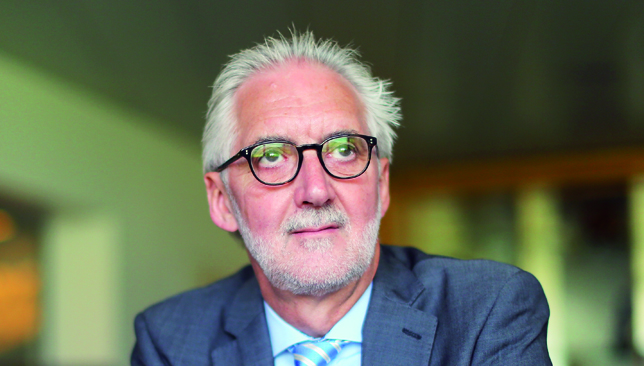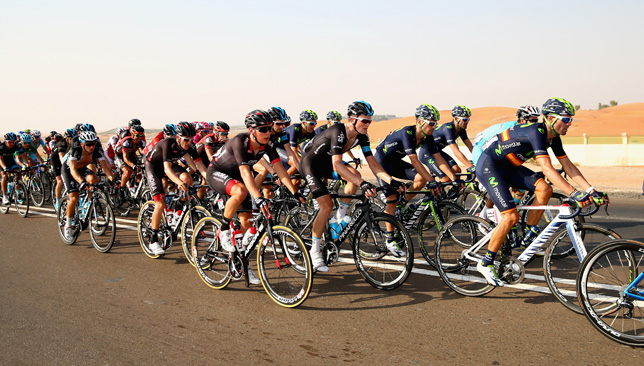
Superstar sprinter Mark Cavendish and Brian Cookson, the president of the UCI – the world governing body of cycling – will be in the UAE capital on Tuesday to meet with the organisers of the Abu Dhabi Tour ahead of the second staging of the event that will take place from October 20-23, 2016.
Cookson, who has been UCI president since September 2013, has seen encouraging signs from the inaugural edition of the Abu Dhabi Tour and the first three editions of the Dubai Tour and believes the Gulf region can play an important role in world cycling. Sport360 caught up with Cookson ahead of his UAE visit, to discuss his vision for the sport in the region, the challenges currently facing cycling and the reform proposals that could impact its future.
Tell me about your visit to Abu Dhabi on Tuesday, what’s the main reason behind your trip?
I’m going to hear about the plans for the 2016 Abu Dhabi Tour in October and about the UCI Gala Dinner which we hope to organise again and other plans for improving and promoting cycling in Abu Dhabi.
With two 2.HC stage races taking place in the UAE each year, and the World Championships set to be held in Qatar this October, how would you describe the role of this region in the development of the sport?
It’s a very important region for the development of cycling. Clearly the region is interested in putting on big races and attracting some big stars and investing in our sport generally. It will be nice I think to see some of the big teams backed by interest from this part of the world.
I think also part of what we’re doing at the UCI is to develop cycling as a sport and pastime for the health benefits it brings to the population. It’s great for the environment, cycling is good for cutting down on transport and traffic problems. All developed nations know the problems of health and fitness and obesity those are of vital importance to the health of the population and that’s something cycling can do something about.
What’s been your initial impression of the Abu Dhabi and Dubai Tours?
Both great events that have a lot of potential. The riders like to come to Dubai and Abu Dhabi and they enjoy the nice quality hotels, the resources that are available and the good roads. It can be a little hot at times of the year of course and that’s something we have to be careful about but equally, the potential for encouraging and promoting cycling in this region is absolutely huge.
Do you see either one of those events getting UCI WorldTour status anytime soon?
The high level of organisation of both those events is very encouraging. At the moment we’re in the process of appraisal, looking at where we can expand the UCI WorldTour and that’s a process that’s going to go on this year and we hope to make decisions later this year about the future of the WorldTour and which events will be part of that. It’s great that there is such interest from this part of the world in coming into the UCI WorldTour.
Is the UCI Awards Gala that was introduced for the first time last October in Abu Dhabi going to be a permanent annual fixture held here in the UAE, or will the event move around the world in the future?
We have an open mind at the moment. We’re looking at all the elements of the calendar and of the WorldTour and all our major events. Abu Dhabi has made a great start, it was a wonderful event last year and we’re going to do it again later this year. Whether that continues in future years, we’ll talk to our friends in Abu Dhabi and hopefully make a decision in the next few months on the future of the gala.
Cycling is a sport that is steeped in tradition and heritage, but it is relatively new in this part of the world. How do you create that cycling culture?
I think you could say that we have a blank page. We have countries that have no real history or heritage of cycling so we have a wonderful opportunity to convince those parts of the world of the beauty of cycling, the value it brings to society and the excitement it can bring as a sport. We have absolute commitment that we want to develop cycling in new parts of the world but we also want to protect that valuable heritage that you mentioned. So that’s why we’re interested in bringing our sport to your part of the world.
Mechanical doping has been a hot topic in the past few months, particularly now following the claims recently made by the French TV programme, Stade 2, that hidden motors have been detected in seven bikes in two prominent Italian races. How serious is this problem and is the UCI making it a priority?
There have been allegations of, what I prefer to call it technological fraud or technological cheating, rather than doping – there’ve been allegations of that for many years now. UCI has been testing for a while but for the last year or so, we’ve spent a lot of time and efforts in developing a system for checking the bikes, so we don’t need to take the bikes apart to see if there’s any cheating.
We’ve introduced that this year. We caught someone (Femke Van den Driessche) trying to use this method of cheating in Belgium at the World Cyclo Cross Championships as you know and we’ve tested over 2,000 bikes already this year in other events and we haven’t found anybody yet.
But clearly this is an important challenge to our sport and if there are people considering cheating in this way then we must develop the technology and protocols to stop them. I think we’ve made great progress in doing that.
Mechanical Doping in Cycling? Judge for yourself:
— CyclingHub.tv (@CyclingHubTV) April 17, 2016
Part 1: https://t.co/TuYpq3UOJf
Part 2: https://t.co/RiYtl8o7Li pic.twitter.com/8Qs2M2cySw
We’ve got a really effective method that allows testing of a large number of bikes before, after and even during the races. I’m confident that we’re ahead of this problem.
I guess there will always be people trying to find new ways of cheating but some of the things that I’ve read in the media in the last couple of weeks I think are pretty tenuous and I’m not so sure that the science is there to back up those rather outlandish claims. But we take all these things seriously and we’ll do our best to make sure we’ll investigate them thoroughly.
There’s been a lot of talk about the proposed WorldTour reforms. In your opinion, what are the most important actions that need to be taken to move the sport forward?
I think the main thing is that we have to try and get the teams onto a more stable economic footing. They’ve been very fragile and very subject to the whims and decisions of individual personalities from time to time now. So I want to try and find a way of helping the teams to get on a stronger financial basis, that’s why we’re offering them three-year licenses, as part of the proposals.
I want to try to make sure that we still have sporting integrity so that they don’t take things too easily once they get their license. We also have an annual examination of their ability to continue to operate within the financial limits that they’ve committed to, and that they continue to do their jobs with integrity. We all know the challenges that cycling and many other sports have faced in the past and will face in the future.
We at the same time want to make sure that the events that are part of our calendar are of the highest quality and that they do their job effectively, and put on safe and secure events with good prize money and good hotels and decent facilities and arrangements for the teams as well.
At the same time, we want to develop cycling in new parts of the world, in Asia, the Gulf, Africa, South America and so on but we have to make sure that we protect the existing heritage of our sport that has made it such a wonderful, dynamic and exciting sport.

The Abu Dhabi Tour will take place from October 20-23.
The ASO (Amaury Sport Organisation, that runs the Tour de France and Vuelta a Espana among other races) have been against these reforms and are threatening to pull their events from the WorldTour. Has their stance changed at all?
We’re still in dialogue with our friends at the ASO and we’re confident that we can come to an arrangement that will convince them to stay within the UCI WorldTour. I think this is something where nobody wants to damage their interest, nobody wants to make anything a problem for them, but we have to let cycling grow.
Cycling is very much contained, if you can say that perhaps cycling, if you compare it to a tree, it’s a rather small plant pot at the moment and it needs to be transplanted and allowed to grow bigger and better and that’s what we’re trying to do with the reforms to the WorldTour.
There have been rumours that Chinese billionaire Wang Jianlin wants to buy the Tour de France and other events. Do you know if that’s true and would it be good for the sport?
I don’t know who is offering to buy what; I do know that Mr. Wang Jianlin is interested in investing in our sport, I’ve met with him and spoken to him. It’s not for me to say who should or shouldn’t own or acquire which events.
I think in general terms, in any business, monopoly is not a good idea unless there’s strong regulation. We as UCI in effect are regulators so it’s important to have diverse ownership of events and of teams as we possibly can to make sure we have a good, open and balanced sport.
I know that Mr. Jianlin is interested in investing in our sport, whether it’s in events or teams, that remains to be seen. We do know that he’s already acquired InfrontRingier company, which owns the Tour de Suisse and a number of other events. So I guess he’s already investing in cycling and it’s an interesting prospect to work with him to help him develop cycling in China and perhaps look at what other interests he has.
Must tragic circumstances be the marker for change? Please @UCI_cycling @cpacycling your riders need you now! pic.twitter.com/nY3yNaS1Cg
— Michael Rogers (@mickrogers) March 28, 2016
There have been several tragic and fatal accidents taking place during races of late, are we going to see new safety protocols implemented soon to try and avoid more incidents like that?
We are looking at trying to reduce the number of motorbikes and cars that accompany races and to make sure that the drivers behave in a safe fashion.
I don’t want to make any knee-jerk reactions, I think it’s important that we study the issues and look at the frequency of these accidents, whether it’s becoming greater or whether there is simply more reporting of them in the days of the internet, but nevertheless, one accident is one too many and we have to make sure that we keep them to a minimum.
So yes, the UCI’s road commission is working very hard on this subject and we will be making some announcements in the next few weeks about changes to procedures and protocols.